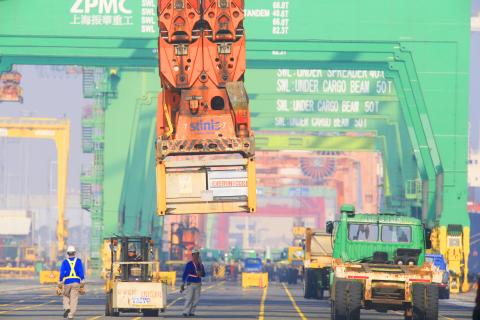The nation’s exports declined 13.9 percent year-on-year last month, as the ongoing economic slowdown in China weakened demand for electronics ahead of the Lunar New Year and low crude prices dampened oil-related shipments, the Ministry of Finance said yesterday.
Outbound shipments dropped to a six-year low of US$22.06 billion last month and might remain sluggish in the coming months due to holiday disruptions and a relative high base in the first quarter of last year, the ministry said.
“The landscape might become clearer in March, when technology firms might start to build up inventory for next-generation devices,” Department of Statistics Director-General Yeh Maan-tzwu (葉滿足) told reporters.

Photo: CNA
Investors’ conferences next week by chipmaker Taiwan Semiconductor Manufacturing Co (台積電) and camera lens supplier Largan Precision Co (大立光) might shed some light on the industry’s order visibility going forward, Yeh said.
The latest export data suggested that inventory adjustments had yet to come to an end, as evidenced by a 7.3 percent decline in electronic shipments and a 31 percent slump in optics exports, she said.
Media reports that Apple Inc may cut production of its iPhone 6S handsets by 30 percent this year due to lackluster sales cast a shadow on earnings outlook for Taiwanese firms in the tech giant’s supply chain, the ministry said.
Imports shrank more than exports last month, falling 15.6 percent year-on-year to US$17.89 billion and widening from a 13.7 percent fall in November, ministry data showed.
The ministry attributed the weakness to companies’ reluctance to replenish raw material and electronics stocks amid a slowing demand.
That left a trade surplus of US$4.17 billion for last month, a 5.6 percent decrease from the same period a year earlier, the ministry said.
For the whole of last year, Taiwan’s exports fell 10.6 percent from 2014 and imports plunged 16.5 percent year-on-year, both faring slightly weaker than the government’s forecasts made in November.
The declines in exports came as all trading partners of Taiwan tightened their belts, as shipments plummeted 12.3 percent to China (including Hong Kong), 14.6 percent to Southeast Asia, and 1.7 percent to the US, while exports also dropped 3.1 percent to Japan and 11 percent to Europe, the ministry said.
The poor data reflected a continued slowdown across the world in which downside risks loom larger than expected earlier, Yeh said.
Expectations that oil prices will soon stabilize appear unlikely to be realized, as oil exporting nations refuse to rein in the supply glut, she said.
A lack of knockout innovations and growing competition from technology firms in China raise further uncertainty about Taiwan’s export outlook, the ministry said.
Taiwan Institute of Economic Research (台經院) economist Gordon Sun (孫明德) said that exporters in Taiwan are facing fierce challenges ahead.
Apart from the rise of the fast-growing Chinese electronic components makers, the depreciation of the yen and the euro will also have a negative impact on the competitiveness of Taiwanese exporters, Sun said.

In Italy’s storied gold-making hubs, jewelers are reworking their designs to trim gold content as they race to blunt the effect of record prices and appeal to shoppers watching their budgets. Gold prices hit a record high on Thursday, surging near US$5,600 an ounce, more than double a year ago as geopolitical concerns and jitters over trade pushed investors toward the safe-haven asset. The rally is putting undue pressure on small artisans as they face mounting demands from customers, including international brands, to produce cheaper items, from signature pieces to wedding rings, according to interviews with four independent jewelers in Italy’s main

Japanese Prime Minister Sanae Takaichi has talked up the benefits of a weaker yen in a campaign speech, adopting a tone at odds with her finance ministry, which has refused to rule out any options to counter excessive foreign exchange volatility. Takaichi later softened her stance, saying she did not have a preference for the yen’s direction. “People say the weak yen is bad right now, but for export industries, it’s a major opportunity,” Takaichi said on Saturday at a rally for Liberal Democratic Party candidate Daishiro Yamagiwa in Kanagawa Prefecture ahead of a snap election on Sunday. “Whether it’s selling food or

CONCERNS: Tech companies investing in AI businesses that purchase their products have raised questions among investors that they are artificially propping up demand Nvidia Corp chief executive officer Jensen Huang (黃仁勳) on Saturday said that the company would be participating in OpenAI’s latest funding round, describing it as potentially “the largest investment we’ve ever made.” “We will invest a great deal of money,” Huang told reporters while visiting Taipei. “I believe in OpenAI. The work that they do is incredible. They’re one of the most consequential companies of our time.” Huang did not say exactly how much Nvidia might contribute, but described the investment as “huge.” “Let Sam announce how much he’s going to raise — it’s for him to decide,” Huang said, referring to OpenAI

The global server market is expected to grow 12.8 percent annually this year, with artificial intelligence (AI) servers projected to account for 16.5 percent, driven by continued investment in AI infrastructure by major cloud service providers (CSPs), market researcher TrendForce Corp (集邦科技) said yesterday. Global AI server shipments this year are expected to increase 28 percent year-on-year to more than 2.7 million units, driven by sustained demand from CSPs and government sovereign cloud projects, TrendForce analyst Frank Kung (龔明德) told the Taipei Times. Demand for GPU-based AI servers, including Nvidia Corp’s GB and Vera Rubin rack systems, is expected to remain high,